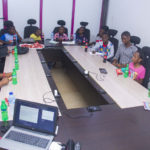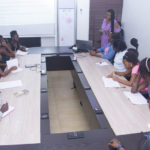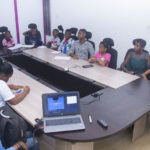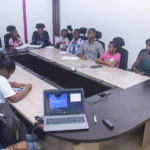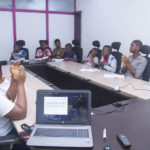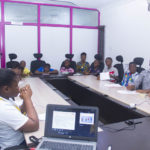I am delighted to let you know that BeamLight Foundation Coaching/Mentoring class for Preteens & Teens held on Saturday, 27th April was exciting. Topics treated were: 1. Dealing with Obsessive Cravings; 2. How to Excel in a Difficult and an Uninteresting Subject Part 2.
Participants were made to understand that obsessive craving/compulsion (O-C) is a type of mental imbalance. A person suffering from this kind of mental imbalance often loses control of his/her sense of reasoning. Obsessive-compulsive disorder (OCD) is defined as a mental disease that causes an individual to do something repeatedly for no reason. Craving according to Merriam-Webster dictionary is an intense, urgent, or abnormal desire or longing for something. Examples are craving for chocolate, ice-cream, sex, pornography et cetera. Obsession can occur when we are drawn away by our own desires and are enticed (James. 1:14), through the company we keep, through the way we make use of our five senses (sight, hearing, smell, taste and touch) etc. You can deal with obsessive craving through personal leadership (that is, leading yourself – the ability to define a direction for your leadership and life, and to move in that direction with consistency and clarity). A few tips on personal leadership include: 1. Determine the source and root of your obsession; 2. Find out what triggers the action and address it; 3. Tell yourself the truth about consequences; 4. Remind yourself of whom you truly are (God’s own); 5. List out God’s promises for you as regarding the root cause of those cravings; 6. Make a clean break. Delete, end ungodly relationships and clean up; 7. Get an accountability partner to hold you responsible every step of the way.
Also, participants learnt that to Excel in a Difficult and an Uninteresting Subject one need to learn how to get the most out of a class and how to focus on the big picture. In getting the most out of a class, participants were encouraged to: 1. Follow the assignments carefully (that is, don’t skip class, don’t try to multitask in class, attend any extra test-preparation or study sessions offered, complete all the assignments in order and on time). 2. Study with friends (however note that you are to choose your study group and be careful not to rely too heavily on friends who find the subject easy). 3. Explain the material to someone who isn’t in your class (e.g. your sibling, try to teach him/her the subject to the best of your ability); practice solving problems on your own. 4. Seek out different ways of absorbing material (learning the same material through different modes can increase retention). 5. Get to know your teacher (find out why he/she finds the subject interesting and let him/her know where exactly you are having difficulty). 6. Find out if you have a learning disability. In order to maintain a good focus you need to: 1. Get enough rest; 2. Take break in your work to allow for recovery and flashes of insight; 3. Manage distractions (don’t let your struggle with the subject lead you into endless procrastination; 4. Try different things (there is no one, single way to learn a subject. Play around with different study techniques, different ways of taking notes, and different approaches to solving problems); 5. Don’t let the subject intimidate you! 6. Reward your hard work and recognise your achievements. (References: i. Beth Werrell “5 Study Tips to Making Tough Subjects Easier to Learn”; published 29th September 2015; updated 9th January 2017. ii. “How to Ace Your Worst School Subject”; WikiHow to do anything …)
Thanks be to God for yet another successful class. Thanks also to all members, volunteers, and supporters of BeamLight Foundation. Find below some scenes from the class:




